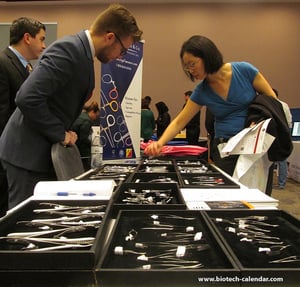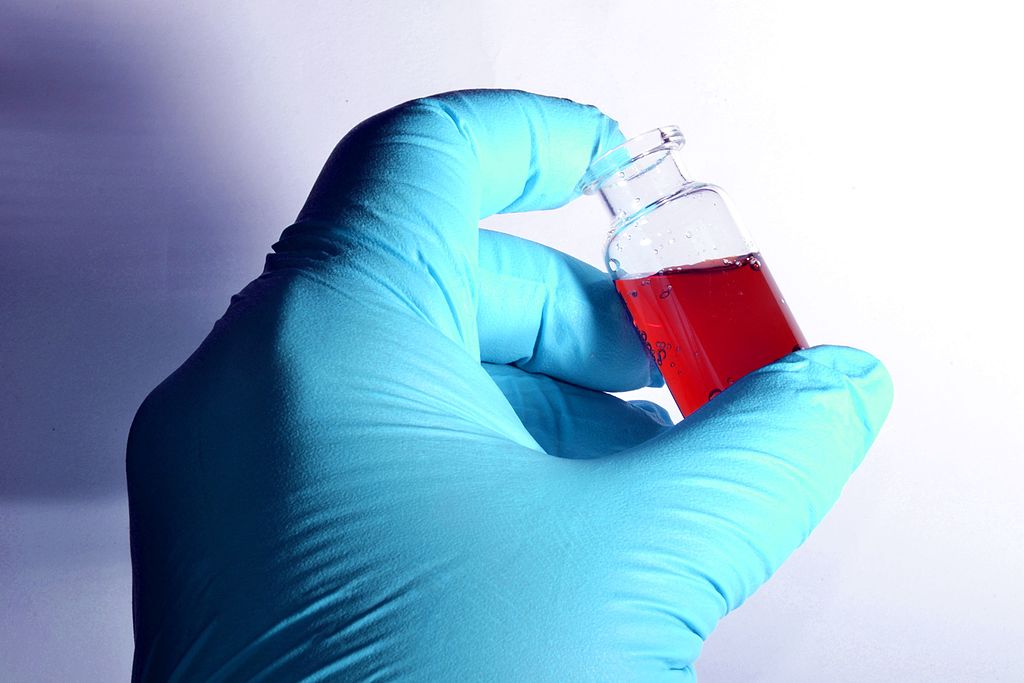Washington University
BioResearch Product Faire™
Posted by BCI Staff on Mon, Sep 28, 2020
Tags: Washington, Washington University, WashU, 2020
Posted by Dianna Matyola on Fri, Mar 29, 2019
New research at Washington University School of Medicine in St. Louis is aimed at investigating whether an already FDA-approved medication is effective in preventing hearing loss. The anti-seizure drug, zonisamide, is being evaluated. In the trial, the drug will be given to police officers and skull surgery patients before being exposed to loud noise. Zonisamide has previously been shown to lessen the damaging effects of hearing loss in animal trials and is typically given as a safe drug for epilepsy with minimal side effects. The project received a $10.5M grant from the Department of the Army and will be led by Washington University in collaboration with the University of Texas at Dallas, the University of Akron, Ohio, and Gateway Biotechnology in St. Louis.
Hearing damage, specifically hearing loss and tinnitus (ringing in the ears), is the most common disorder effecting members of the military. This research is intended to impact and improve quality of life for military members and their families.
This study is just one of more than 3,000 research projects underway at Washington University. Another includes the $18.5M National Institute of Health (NIH) funded Dominantly Inherited Alzheimer Network Trials Unit (DIAN-TU), a clinical trial testing multiple drugs to slow or block the development of Alzheimer’s disease in individuals inherently at risk. Additionally, Rodger and Paula Riney charitably donated another $15M for Alzheimer’s and Parkinson’s research, making Washington University a significant contributor in neurodegenerative and aging research along with other universities, such as the University of Southern California (see link: http://info.biotech-calendar.com/usc-recieves-13.98m-for-alzheimers-clinical-trial-consortium ).
Public Domain, https://commons.wikimedia.org/w/index.php?curid=505622
Washington University School of Medicine is one of the largest life science-focused recipients of NIH funding Nationwide. In the 2017 fiscal year, Washington University received the highest R&D funding it has in the course of the past decade, with $672M of the $754.4M total R&D being in Life Science expenditures.
Later this spring Biotechnology Calendar, Inc. looks forward to hosting its 20th annual BioResearch Product Faire™ event at Washington University. The event will take place Friday, April 19th, 2019.
If you are looking to sell lab research products to this marketplace, consider these facts:

Last year's show was a great success. We had a total of 338 attendees of which 120 were professors, post docs and purchasing agents. 57 attendees were lab managers with the remaining balance being both research associates and postgraduate students. This event is the perfect place to network with life science researchers and laboratory suppliers. We hope you will join us at the upcoming Washington University BioResearch Product Faire™ event.
Washington University BioResearch Product Faire™ event - April 19th, 2019
Read More
Tags: WashU, National Science Foundation, BioResearch Product Faire, WashU researchers, Department of the Army, Science News
Posted by Rebecca Inch-Partridge on Thu, Dec 07, 2017
According to the National Cancer Institute (NCI) there are over 380,000 people living with leukemia in the United States. Each year roughly 24,500 people die from the disease and over 62,000 new cases are diagnosed. To improve treatment options for leukemia patients, the NCI recently awarded John DiPersio, MD, PhD of Washington University, St. Louis $6 million in research funding. The Professor of Medicine in Oncology at the university’s School of Medicine will use the seven years of funding to support three major areas of leukemia research in his lab. These include: improving the effectiveness of standard chemotherapy, preventing graft-versus-host disease, and developing new immunotherapies.
Read MoreTags: Washington University St. Louis, Washington University, WashU, WUSTL, Leukemia, cancer research, Cancer, Research Funding, biotech vendor show, cancer research funding, Bioresearch Grant, Biotechnology trade show, NIH awards 2017, Cancer Therapeutics, Cancer Immunotherapy
The Biotechnology Calendar, Inc. BioResearch Product Faire™ will be returning to Washington University, St. Louis for its 19th Annual event. WashU's Life Science R&D Expenditures and NIH funding has been totaling about $1 Billion the past few years proving the University's dedication to being at the forefront of life science research and providing a prime opportunity for boosting scientific sales.
Read MoreTags: Washington University St. Louis, Washington University, WashU, MO, St Louis, 2018
Posted by Laura Braden on Tue, Oct 24, 2017
 Washington University in St. Louis has 1 of 57 Institutes of Clinical and Translation Sciences (ICTS) in the United States. The ICTS at Washington University focuses on translating discoveries from both translation and clinical research into new treatments and therapies. The ICTS does not focus on just one area of life science research. Instead, researchers from all spectrums on the health sciences are able to use the institutes resources to further their work on topics like disease prevention and treatment. Training programs are also offered through the institute for researchers. (Image courtesy of P. David via Wikimedia Commons)
Washington University in St. Louis has 1 of 57 Institutes of Clinical and Translation Sciences (ICTS) in the United States. The ICTS at Washington University focuses on translating discoveries from both translation and clinical research into new treatments and therapies. The ICTS does not focus on just one area of life science research. Instead, researchers from all spectrums on the health sciences are able to use the institutes resources to further their work on topics like disease prevention and treatment. Training programs are also offered through the institute for researchers. (Image courtesy of P. David via Wikimedia Commons)
Tags: Washington University St. Louis, WashU, BioResearch Product Faire Event, MO, NIH funding, Clinical and Translational Research, 2018, clinical and translational research funding
Posted by Sam Asher on Thu, Mar 24, 2016
Chemical bioengineers find and create bacteria for several different purposes, such as eating chlorine and consuming toxic byproducts of biodiesel plants. A closer look at these bacterial communities undertaken in a study at Washington University in St. Louis shows that there is actually a division of labor between bacterial workers and layabouts.
Read MoreTags: WashU, BioResearch Product Faire Event, MO, St Louis, Washington Univsersity St. Louis, 2016
Posted by Laura Braden on Fri, Feb 19, 2016
The National Institutes of Health (NIH) recently launched a new network of institutions - called the Centers for Common Disease Genomics (CCDG) - which will study common conditions such as heart disease, stroke, diabetes, and autism to see how genetics and DNA contribute to the risk of these diseases. The McDonnell Genome Institute at Washington University in St. Louis is one of four institutions involved in this network and will be receiving $60 million over the next four years to study genomics and common diseases.
Read MoreTags: Washington University St. Louis, Midwest, Missouri, WashU, heart disease, Diabetes, Autism, BioResearch Product Faire Event, MO, St Louis, NIH funding, 2016, Centers for Common Disease Genomics, stroke, CCDG
Posted by Sam Asher on Thu, Jan 28, 2016
For years, we’ve been discussing reasons not to use antibiotics and have seen the development of new alternatives, such as spray-on antibodies and internal bacterial combustion. Despite this, antibiotics continue to be widely used today. Scientists at Washington University in St. Louis theorize that antibiotics are here to stay, but perhaps it is the definition of antibiotics that needs to be changed.
Read MoreTags: Washington University St. Louis, WashU, BioResearch Product Faire Event, MO, St Louis, 2016
Posted by Laura Braden on Tue, Jan 12, 2016

Multiple myeloma is a rare form of cancer that affects the immune system in about 0.7% of Americans. According to the American Cancer Society, approximately 26,850 new cases were expected to be diagnosed in 2015, and 11,240 deaths were expected to occur. Although there are treatments available to fight this cancer, patients frequently relapse, demonstrating the need for new treatments.
Read MoreTags: Washington University St. Louis, Midwest, WashU, St. Louis Bioresearch Product Faire Event, cancer research, Cancer Treatment, MO, St Louis, new funding, 2016, BioResearch Product Faire, Multiple Myeloma
 Life science research institutions around the country are constantly expanding and providing more space and opportunity for researchers to conduct their work. Recently, Baylor St. Luke's at the Texas Medical Center announced the construction of a new medical campus that was underway and UGA opened a new Veterinary Research Center earlier this year. Washington University in St. Louis is also expanding research space, with a newly opened Center for Regenerative Medicine.
Life science research institutions around the country are constantly expanding and providing more space and opportunity for researchers to conduct their work. Recently, Baylor St. Luke's at the Texas Medical Center announced the construction of a new medical campus that was underway and UGA opened a new Veterinary Research Center earlier this year. Washington University in St. Louis is also expanding research space, with a newly opened Center for Regenerative Medicine.
Tags: Midwest, Washington University, WashU, Regenerative Medicine, MO, St Louis, New research center, 2016, BioResearch Product Faire